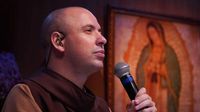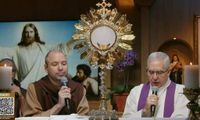On March 21, 2025, a remarkable religious phenomenon took over social media as Frei Gilson da Silva Pupo Azevedo led a live rosary that captivated over 1 million viewers simultaneously. The live event, which began slightly more than 82 minutes before midnight (PDT), significantly reinforced the priest's status as one of Brazil's most influential figures in digital evangelization.
At just 38 years old, Frei Gilson returned to prominence with this unprecedented live broadcast. He leads the Carmelitas Mensageiros do Espírito Santo congregation and the musical group Som do Monte, leveraging modern platforms like YouTube, Instagram, and Spotify to spread messages of faith. The event was strategically scheduled ahead of Easter, aligning with the Lenten season.
During the live broadcast, which included the hashtag #Quaresma2025, Frei Gilson guided the prayer of the rosary—an essential aspect of Catholic devotion. Significantly, he promoted the app “Oração Play!”, accessible for both Android and iOS users, which offers a rich array of videos, music, prayers, and a virtual store, encouraging deeper engagement with Catholic spirituality.
His influence has grown exponentially, with his YouTube subscriber count skyrocketing to over 5 million. In the two weeks preceding the live rosary, Frei Gilson gained an impressive 740,000 new subscribers. These numbers reflect not only the success of his live events but also the increasing demand for accessible religious content in the digital age.
However, this rise to fame has not been without controversy. Recently, Frei Gilson has been caught in a political storm, facing both support and criticism across social media platforms. In March 2025, Deputy Paulo Bilynskyj from São Paulo proposed a bill aimed at criminalizing online attacks against religious leaders, inspired by the intense criticism directed at the priest.
Critics have accused Frei Gilson of fostering an extreme right-wing agenda and collaborating with former president Jair Bolsonaro, a claim he has denied. Nevertheless, his association with Bolsonaro, mainly due to a prayer he made for the country that mentioned communism, has sparked significant discussions about his role in Brazilian society. Reports indicate that some of the videos he removed from his YouTube channel were from a period when he appeared to broadly support ideologies associated with Bolsonaro.
Despite these distractions, Frei Gilson's events continue to draw massive audiences. His nightly vigils—live prayers at 4 AM—have become a routine for many followers, exemplifying their devotion. His accessible approach to evangelization enables him to connect with both traditional and modern audiences, bridging gaps that have separated individuals from religious practices.
The live rosary on March 21 was indeed a detailed showcase of how Frei Gilson engages with his audience. Viewers were invited to submit prayer requests in real-time, a feature that creates a sense of community and belonging among participants, further enhanced by constant interaction from the priest.
Notably, this engagement extends beyond the communications realm. Frei Gilson has successfully integrated music into his teachings, believing it serves as a connecting thread to reach hearts and convey faith-based messages. His music group, Som do Monte, which has released songs like “Acalma minha tempestade,” is particularly popular, garnering millions of views on streaming platforms. This innovative blend of spirituality and entertainment has created a unique method for spreading religious messages, providing enriching experiences for his audience.
Frei Gilson's prominence is also reflected in his recent initiative aimed at amplifying the church's voice in the digital world. The app “Oração Play!” combines various spiritual resources and underscores his commitment to fostering community through technology. As digital life intertwines with day-to-day activities, leaders like Frei Gilson represent a formidable shift in how religious figures can influence their followers.
This phenomenon raises questions about the future trajectory of Catholicism in Brazil, where numerous denominations vie for the attention of the faithful. Many observers are quick to note that Frei Gilson's approach to modernization through social media and technology is a crucial step in keeping the Catholic faith relevant amid rising secularism.
As events unfold, the reality remains that Frei Gilson will likely continue to play a vital role in shaping the digital landscape of religious practice in Brazil. His capacity to attract vast audiences, whether through daily prayer sessions or engaging live performances, allows him to invite many into spiritual conversations.
In summary, Frei Gilson da Silva Pupo Azevedo is not merely a priest; he is a trailblazer in the religious digital space. His strategic utilization of various platforms, coupled with unwavering conviction, signals a new era in faith engagement for the Catholic Church in Brazil. Frei Gilson stands at the helm of this transformation, leading believers into a dynamic space where spirituality and technology coexist harmoniously.



